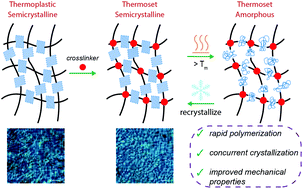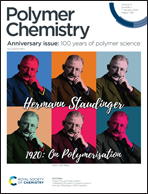Additive manufacture of lightly crosslinked semicrystalline thiol–enes for enhanced mechanical performance†
Abstract
Photopolymerizable semicrystalline thermoplastics resulting from thiol–ene polymerizations were formed via fast polymerizations and achieved excellent mechanical properties. These materials have been shown to produce materials desirable for additive manufacturing (3D printing), especially for recyclable printing and investment casting. However, while well-resolved prints were previously achieved with the thiol–ene thermoplastics, the remarkable elongation at break (εmax) and toughness (T) attained in bulk were not realized for 3D printed components (εmax,bulk ∼ 790%, Tbulk ∼ 102 MJ m−3vs. εmax,print < 5%, Tprint < 0.5 MJ m−3). In this work, small concentrations (5–10 mol%) of a crosslinker were added to the original thiol–ene resin composition without sacrificing crystallization potential to achieve semicrystalline, covalently crosslinked networks with enhanced mechanical properties. Improvements in ductility and overall toughness were observed for printed crosslinked structures, and substantial mechanical augmentation was further demonstrated with post-manufacture thermal conditioning of printed materials above the melting temperature (Tm). In some instances, this thermal conditioning to reset the crystalline component of the crosslinked prints yielded mechanical properties that were comparable or superior to its bulk counterpart (εmax ∼ 790%, T ∼ 95 MJ m−3). These unique photopolymerizations and their corresponding monomer compositions exhibited concurrent polymerization and crystallization along with mechanical properties that were tunable by changes to the monomer composition, photopolymerization conditions, and post-polymerization conditioning. This is the first example of a 3D printed semicrystalline, crosslinked material with thermally tunable mechanical properties that are superior to many commercially-available resins.



 Please wait while we load your content...
Please wait while we load your content...